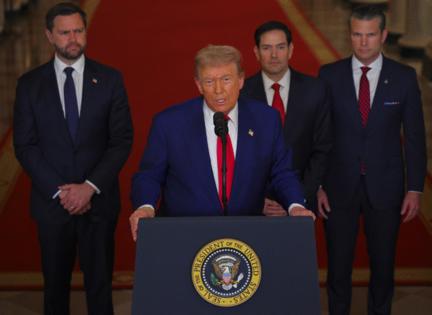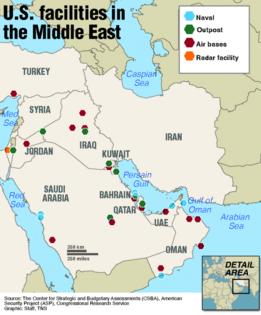Trump announces tentative ceasefire between Israel and Iran
Published in News & Features
President Donald Trump announced Israel and Iran had agreed to what he called a “complete and total” ceasefire, easing fears that a conflict between the two adversaries might escalate.
Trump, who made the surprise announcement on his Truth Social platform days after ordering airstrikes on Iran’s nuclear facilities, said the accord would begin around midnight U.S. time and is aimed at a lasting end to the fighting.
Iranian Foreign Minister Abbas Araghchi said in a tweet afterward that while there is no ceasefire agreement, his country had no intention to keep responding to Israeli attacks after 4:00 a.m. Tehran time.
“As of now, there is NO ‘agreement’ on any ceasefire or cessation of military operations,” Araghchi said. “However, provided that the Israeli regime stops its illegal aggression against the Iranian people no later than 4 am Tehran time, we have no intention to continue our response afterwards.”
“The final decision on the cessation of our military operations will be made later,” he added.
Israel had no immediate comment on either Trump’s post or the Iran foreign minister’s remark.
West Texas Intermediate crude fell as much as 6% in early Asia trading after Trump’s comments. S&P 500 futures rose 0.5%, while stocks opened higher in Japan and Australia. The dollar weakened against major currencies.
If the deal endures as Trump described, it would mark a dramatic foreign policy success for the president and end violence that began when Israel launched attacks against Iran’s nuclear sites, top generals and scientists, and other targets on June 13. Iran has responded with several days of missile strikes on Israel.
Local media in Iran reported intensified Israeli attacks early Tuesday. Air defense activity was said to be ongoing across several cities, with multiple heavy explosions rocking the capital. State television broadcast footage showing what it claimed was debris from the wreckage of an Israeli drone, engulfed in flames in a residential neighborhood.
Trump brokered the ceasefire in a direct conversation with Israeli Prime Minister Benjamin Netanyahu on Monday, according to a senior White House official. Vice President JD Vance, Secretary of State Marco Rubio and special envoy Steve Witkoff held both direct and indirect talks with the Iranians about the proposal, the official said.
Israel agreed to the ceasefire as long as Iran did not launch further attacks, and the Iranian government signaled it would abide by those terms, according to the official.
Vance said the president had been “working the phones constantly” Monday with a goal of getting an agreement. Speaking to NBC News in a brief interview on Monday, Trump predicted the peace between Israel and Iran would be long-lasting.
“I think the ceasefire is unlimited — it’s going to go forever,” Trump said, adding that he sees the war as being completely finished and does not believe Israel and Iran “will ever be shooting at each other again.”
Many questions remain, including the state of Iran’s uranium stockpile and whether the ceasefire might lead to discussions about Iran’s nuclear program. The country, which has denied it’s seeking an atomic weapon, has refused to give up the right to enrich uranium, a condition the U.S. has insisted on.
There’s no guarantee the truce will hold if Iran tries to repair the nuclear facilities that were hit by Israeli and U.S. strikes. Israel says its war against Iran aims to prevent the country from acquiring atomic weapons, a risk also cited by Trump to justify U.S. involvement.
“For now, I think this is going to hold, and I think you will have an end to the war,” said Dennis Ross, who was President Bill Clinton’s envoy to the region and is now a fellow at the Washington Institute for Near East Policy. “Iran has no interest in resuming anything soon.”
A diplomat briefed on the talks said Trump had spoken with Qatar’s Emir and informed him the U.S. got Israel to agree to a ceasefire with Iran, and asked for help persuading Iran to do the same. Iran later agreed, according to the diplomat, who asked not to be identified discussing private conversations.
Trump’s announcement came just hours after Iran fired missiles at the Al Udeid Air Base in Qatar, where U.S. Central Command has its regional headquarters, after promising it would respond “proportionately and decisively” to the weekend bombing by U.S. forces of three nuclear facilities. Qatar said the Iranian missile barrage was intercepted and the base had been evacuated in advance.
Speaking to Fox News after Trump announced the ceasefire, Vance said that the U.S. bombing over the weekend had met its objectives.
“We know that they cannot build a nuclear weapon,” Vance said, adding that Iran’s existing stock of highly enriched uranium was “buried” by the attack. International monitors have said they don’t know where that material is after Iran said earlier this month it would move it.
“If Iran is desperate to build a nuclear weapon in the future, then they’re going to have to deal with a very, very powerful American military,” Vance said.
Iran’s move on Monday appeared to be “a largely symbolic retaliation,” said Ziad Daoud, Bloomberg Economics’ chief emerging-market economist. “Plenty of warning was given — Qatar shut its airspace and the U.S. issued warnings to citizens.”
Iranian officials also suggested the move had a symbolic element. The number of missiles fired matched the number of bombs deployed by the U.S. against the nuclear sites at Fordo, Natanz and Isfahan, and the Qatar strike “poses no danger” to a “friendly and brotherly country,” the state-run IRNA news agency said.
“If that’s all that happened, that missiles were launched, they were intercepted and there’s limited damage and hopefully not casualties, it can be potentially taken as a performative response,” said Daniel Shapiro, a former U.S. ambassador to Israel now with the Atlantic Council. “That opens up a pathway to diplomacy on establishing the necessary limits on the Iranian nuclear program.”
_____
—With assistance from Eric Martin, Natalia Drozdiak, Dana Khraiche, Golnar Motevalli, Eltaf Najafizada and Annmarie Hordern.
_____
©2025 Bloomberg L.P. Visit bloomberg.com. Distributed by Tribune Content Agency, LLC.










Comments